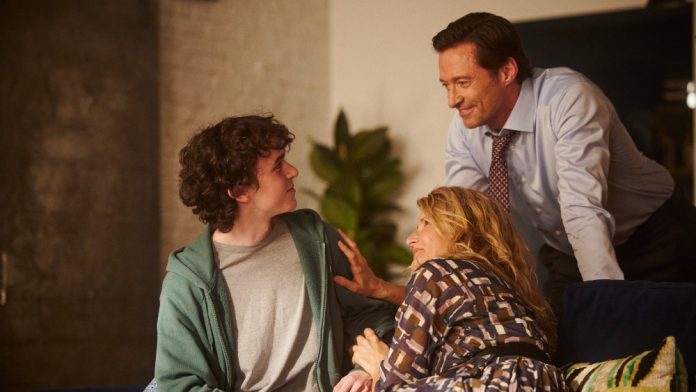Two years ago, The Father, the directorial debut of playwright-turned-filmmaker Florian Zeller, who adapted from his own acclaimed stage play, won two Oscars, including one for the screenplay that Zeller wrote with prior Oscar winner Christopher Hampton (1988’s Dangerous Liaisons).
For his second feature, Zeller adapted another one of his plays, The Son, which reunites him with Anthony Hopkins, who won an Oscar for The Father. However, he plays a relatively small role, as the film instead stars Hugh Jackman as Peter, a political consultant whose ex-wife (Laura Dern) shows up at his new home worried about their teenage son, Nicholas (Zen McGrath). Nicholas has been skipping school and seems to have deeply ingrained emotional issues, which forces the adults in his life (including a stepmother played by Vanessa Kirby) to try to fix things, even if none of them really know how.
The Son is an incredibly powerful and moving film, but it’s also a difficult one that deals honestly with mental health in young people, who statistically have been the most affected by the pandemic. As with The Father, the film isn’t just a strong stage adaptation, but it also demonstrates Zeller’s ability to coax excellent work out of his cast, proving The Father was no fluke in that regard.
Above the Line recently spoke with Zeller over Zoom for the following interview, in which he shed light on the film’s casting and how the shooting schedule helped his actors find their characters, as well as his approach to rehearsals for The Son, which opens in theaters this weekend.
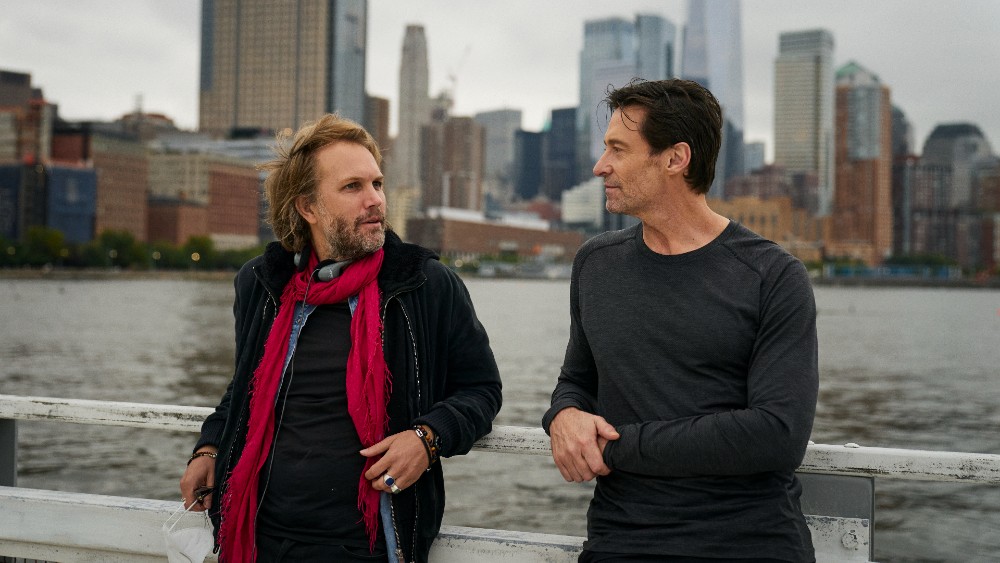
Above the Line: I spoke with Martin McDonagh a few months ago, and he mentioned that he’s really against adapting his plays for the screen, but you’ve now done that with two of your plays. I’m curious what got the ball rolling in terms of the decision to adapt your own work — first with The Father, and again with The Son.
Florian Zeller: I understand what Martin said. I like him very much as a playwright. He’s a friend of mine, and I can understand that he doesn’t want to adapt his own plays. I’m not sure that his plays, even though they are great plays, would make great films. I don’t know. I have no theory about it. It’s just that I come from theater. I’ve written 15 plays, and at some point, there was this conviction to do The Father, based on my play. My plan was not to make films in the first place. At some point, I cannot tell you exactly why, but I had that conviction that I needed to do The Father on screen. I felt that something could be done on screen that was not possible on stage, that I [could] use the cinematic language to achieve something that was not achievable on stage. So that was my first instinct. I did The Father with Anthony Hopkins, and to me, it was an extraordinary experience, but it was the continuity of what I knew about theater, meaning, it’s about telling the story, sharing emotions, and working with actors. It was something that was already my life, in a way.
When I did that, I knew that if I had the opportunity to do another film — because it’s never granted — I would do The Son. It was a strong conviction because I wanted to tell that story so much. Also, I felt that it was a story that needed to be told. It’s about mental health issues, and I had the feeling that even though we are talking all the time about mental health issues, somehow, we are still uncomfortable talking about [them].
I mean, we’re trying to use this [film] to make sure we are good [with] it, but I feel strongly that we are not talking about it. It’s painful to face that pain and to raise the right questions. I wanted to make that film in a very straightforward way, in a very linear way, in a way [that didn’t] shy away from this idea, [but] looked in the eyes of that pain. I [felt] that, especially after COVID, we are going through a mental health crisis and that we still need to have conversations about it to help people. There is so much shame, so much guilt, [and] so much ignorance on these topics that I really wanted to make that film.
ATL: What was the timeframe for making The Son? I think The Father premiered at Sundance three years ago, and then it came out in theaters and was a big part of awards season, so were you already working on The Son at that point, or in pre-production, at least?
Zeller: What happened is that The Father opened at Sundance in 2020, meaning it was a few weeks before the world shut down, and then, it was this weird year for cinema, 2020. It was awards season, but it was mainly lockdown. This is when I started working on the adaptation of The Son, and I shot the film The Son last year. It was still in the middle of COVID. It was shot mainly in the UK at this moment [when] the UK was pretending that COVID [did] not exist anymore. We had to live in a bubble to be able to go through that, and it was kind of interesting because, for that reason, we were a small group of people, in a small space, trying to tell a story that mattered to us. It created an intimacy between all of us that was really relevant. All of them — I’m talking mainly about the actors — they knew why they wanted to make that story, why they wanted to be part of it. For profound and secret reasons, they knew they wanted to tell that story.
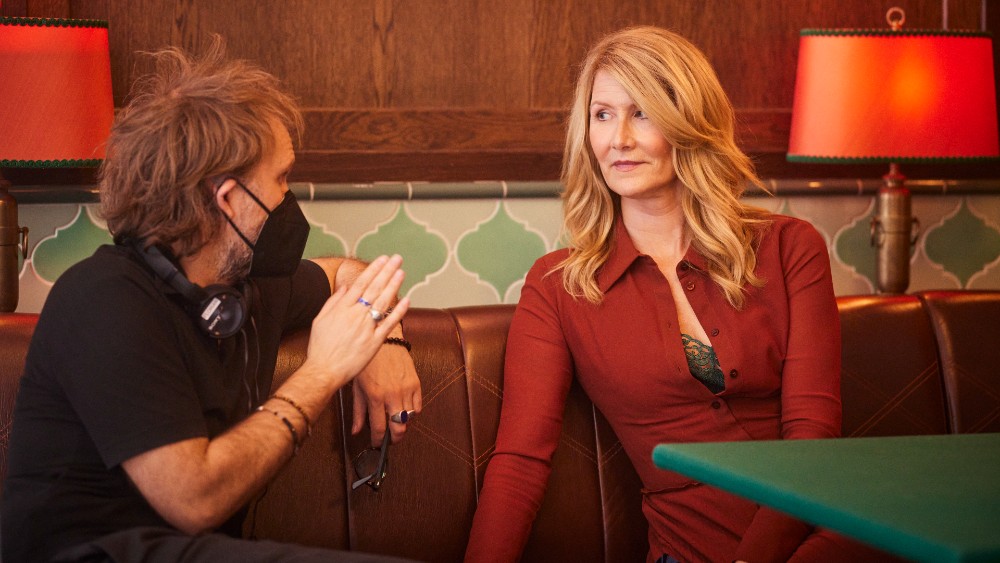
ATL: How long have you known Christopher Hampton, and what convinced you to bring him on to help you with the adaptations?
Zeller: Christopher Hampton is a great British playwright. We met, like, 15 years ago. He came to see one of my plays in Paris, and he started to translate my plays into English, so he’s the one who adapted all my plays into English. We shared a lot of things together, not only the translation but everything that goes with theater, which is opening nights, anxieties, [and] travels. He’s more [than] a collaborator, he’s almost like a brother, and we are very, very connected. I like him very much, and he helps me to do what I do in English, which is not, as you can hear, my first language.
When you do not work in your own language, there is something slightly uncomfortable about it, and so many artistically interesting things could happen because of that. Meaning that you could tell, even in Japanese, when an actor does something, if it’s good or not. If you have to be connected somehow to some[one] else, even when you do not understand the words, you have to be understood and to understand. I love this instinctive connection that you have to create with actors.
ATL: What made you think of Hugh and Laura for those roles? Had they seen the play and reached out to you about being involved in the film adaptation?
Zeller: This is how it happened. It’s slightly not the way it happens most of the time. It was Hugh who approached me in the first place. He knew that I was working on it. He knew the play, and he knew The Father. He wrote to me saying, ‘I know you’re working on it. If you already have an actor in mind, if you’re already in conversation with someone, please forget my letter. But if not, I would love to have 10 minutes to let you know why I should be the one to do that part.’ I was really, really impressed by what he [wrote], in terms of [his] honesty, courage, [and] humility. When we met, I was really impressed and moved, also, to feel that he was not [just an] actor trying to get [a] part. He was not only attracted by the performance that he could [deliver] in this film. He was really like a human being [who] connected as a father with The Son, connected to that story, [and was] aware of the necessity to tell a story about mental health.
I felt that he had everything in himself, all the emotions [were] there. In a way, the work would be just to use the camera to allow himself to be himself, in a way. It takes a lot of courage for an actor to do that. I heard that he would be available, ready, [and] courageous enough to do that. I was really, really impressed by him, when we shot the film, [and how] he was extraordinarily honest, all the time. Never trying to fake, never trying to perform for the sake of performing. He was really naked, in a way. I’m really grateful to him because I know it’s very difficult for an actor to do that.
I felt the same with Laura. I love her. I’ve always adored her. I’m David Lynch‘s biggest fan, and I love her because she’s his muse, but also, I love her because she’s such a great actress, [and] she’s also a mother. I contacted her, and when we met the first time, I felt strongly that she was also talking from that place, as a mother with teenagers. She knows, and she experienced what it is to try to help someone, and sometimes not to know what to do anymore.
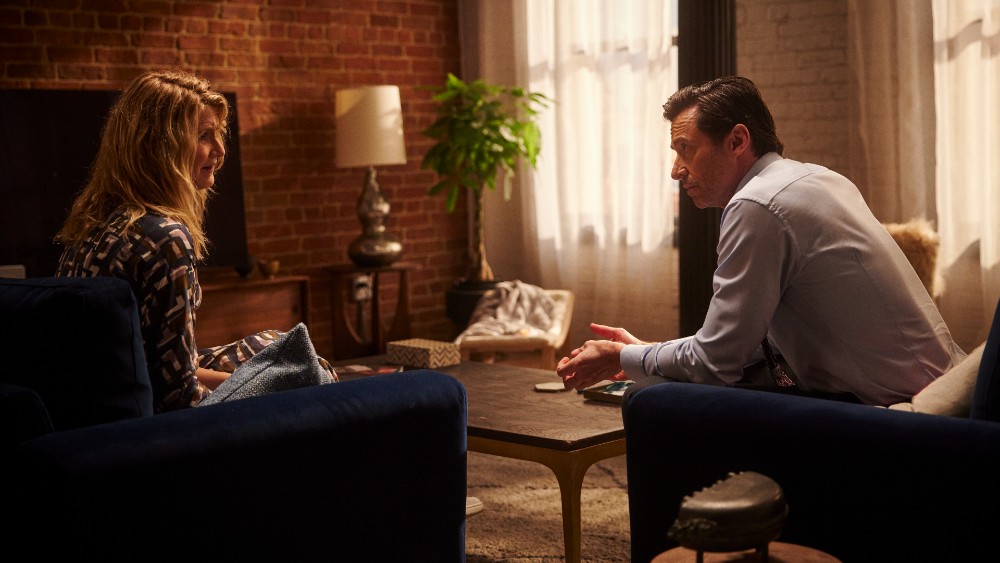
ATL: Of course, I have to ask about Zen, who plays Nicholas, since that’s such a tough role. I don’t know what his experience was as an actor coming into this, but he has some amazing scenes opposite Hugh, Laura, and Vanessa. Where did you find him, and how did you know he was right for Nicholas?
Zeller: It was a year and a half [ago] when I was looking for this actor. I received a lot of self-tapes. It was the middle of COVID, so no meeting in person was possible. I met so many good young actors, but I remember [that] when I saw his tape, I knew he would be the one, even though he was coming from Australia, [and] even though it was complicated in [terms of] COVID, there [was] something about him that really, really impressed me.
His nature [has], I would call it, a certain opacity. It’s hard to understand exactly what is going on through his soul, and it mirrored what I wanted to do in this film. I didn’t want to tell a story about mental health issues and try to explain or justify the pain or the difficulty and [just] resolve it. I wanted to look at it, as it is in real life, [as] a raw thing that you do not understand, like a black hole — something you can try to understand that is still always more difficult to understand, or it’s hidden. I felt that Zen, as a person, and also as an actor, would have the ability to be “uncatchable,” in a way.
ATL: Do you generally rehearse for these movies similar to how you might rehearse for a play, or do you feel it’s a different animal that needs to involve the camera and other film-specific things to work?
Zeller: When you’re on stage, you have to rehearse a lot, of course. For that film, I made the decision not to rehearse at all, because I really wanted the actors not to know exactly what they would do, to have no preconceptions, [and] to deal with what would happen in the now, in the moment, in order to be really raw and real and truthful emotionally. I was really, really happy to do [it] this way and to have actors [who] were ready to jump into this ride. It was not easy all the time, but it was very intense. I’m very proud of what they did, and what we reached in terms of emotion. To me, this is what matters. It was not about trying to overperform; it was about trying to present something that was honest and truthful.
ATL: Was this any more or less complicated than making The Father? That was mostly on one stage and location, so it was more about the production design, but The Son takes place in more locations. I assume you didn’t actually come to New York to shoot here, but how did it compare to making The Father?
Zeller: Every story requires something different. When you start thinking about adapting a play into a script, the first advice that you get is always the same. It’s always like, “Try to open it up. Try to write new scenes outdoors,” and it could make sense or not. For The Father, I made a decision not to open [it] up at all and to stay in the same room, because it was part of the story. The strategy was to try to put the audience in the main character’s brain, in a way, and to create this abstract place — the apartment, [which] was his brain. It was like a labyrinth. The strategy of that film was to try to put the audience in a place where you would experience what they couldn’t know from [their own experiences.]
For The Son, it was completely different. It was not about trying to open it up, it was not about trying to have outdoor scenes, it’s just that the story required something different. What I wanted to do [was] something very linear, very simple, [and] to be as simple [and] straightforward as possible in order to reflect what I was trying to do, which was not to shy away from that pain. I could have done another kind of film where we were more in the teenager’s brain, and [done] a gimmick about mental health issues. It would have been another film, but I really made the decision to try to tell that story from the parents’ perspective. Those who are trying to help, and somehow, don’t know what to do anymore. That’s what I wanted to tell and to do that, I really wanted to have this very simple line, like a tragedy.
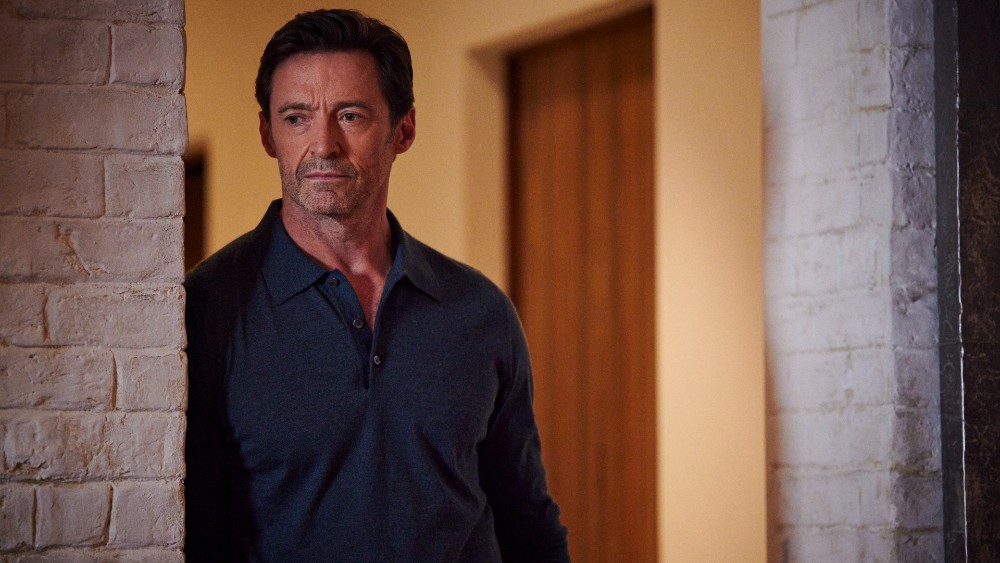
ATL: In that sense, were you able to shoot in chronological order to help create that linear feeling for the actors, or was that not possible?
Zeller: No, we did some of the scenes in a studio, so what is good about a studio is that you can do whatever you want. I mean, never whatever you want. At least you can try to use the set as part of the strategy, and this is what we did. For example, the first scene of the film is Laura Dern knocking at the door of her ex-husband’s apartment, but this is not the first scene that we shot.
Before that, we shot all the scenes in the apartment between Vanessa Kirby and Hugh Jackman. After a few days, we started to feel very comfortable with that space. It was their apartment, their furniture, and then I asked Laura Dern to come, but she was not allowed to come on set before that. I asked her to not even meet Vanessa Kirby before. She didn’t know her at all. So when she knocks at the door, the camera is on her. That’s the very first time [that she] not only meets Vanessa Kirby, but that’s the first very first time she sees something about her ex-husband’s new life — the furniture of that space.
Spending so many hours in the editing room, I can tell that what you see on her face is also connected to the real position where she’s [drawn] to discover something she doesn’t know through the door. She wants to be there, but she’s not allowed to be there. It’s like an intrusion into something you don’t have to want to see. It’s the new life; you’re not part of the new life. So we used the set and the chronology of the shooting to try to create these kinds of emotions and feelings.
ATL: There’s a dedication at the end of the film that I was curious about…
Zeller: There is a dedication at the end of the film, and it’s to Gabriel, my son. It took me a while to make that decision. Is it fair not to do that? Because it was about trying to go against the shame. I feel like there’s a lot of shame around these topics, and I wanted to [have an] open conversation, so I felt maybe I should be the first one not to be ashamed and to open the door.
ATL: I’m sure that you’ve been asked this a lot, but when are you going to adapt The Mother into a movie with Isabelle Huppert?
Zeller: I don’t know yet. We did The Mother in New York in ’19, and she was extraordinary on stage.
ATL: I’m quite upset I missed that.
Zeller: She’s one of the greatest, and it was really so exciting to work with her. But the answer [is], I don’t know yet. I’m still with The Son, and I need to let him live his own life, as you have to do at some point with your own children. And then I will have time and space to question what I want to do next. But [for now], I don’t know yet.
ATL: Do you feel like these films are the be-all and end-all for your plays, or do you feel they will still have life on stage despite the films?
Zeller: I don’t know. Time will tell.
The Son opens nationwide on Friday, Jan. 20 courtesy of Sony Pictures Classics.


